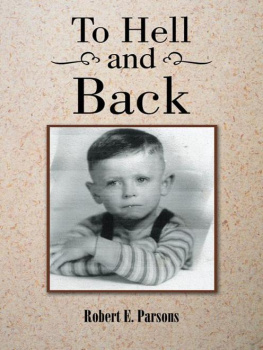Tony Parsons - all there is
Here you can read online Tony Parsons - all there is full text of the book (entire story) in english for free. Download pdf and epub, get meaning, cover and reviews about this ebook. year: 2003, genre: Religion. Description of the work, (preface) as well as reviews are available. Best literature library LitArk.com created for fans of good reading and offers a wide selection of genres:
Romance novel
Science fiction
Adventure
Detective
Science
History
Home and family
Prose
Art
Politics
Computer
Non-fiction
Religion
Business
Children
Humor
Choose a favorite category and find really read worthwhile books. Enjoy immersion in the world of imagination, feel the emotions of the characters or learn something new for yourself, make an fascinating discovery.

- Book:all there is
- Author:
- Genre:
- Year:2003
- Rating:5 / 5
- Favourites:Add to favourites
- Your mark:
- 100
- 1
- 2
- 3
- 4
- 5
all there is: summary, description and annotation
We offer to read an annotation, description, summary or preface (depends on what the author of the book "all there is" wrote himself). If you haven't found the necessary information about the book — write in the comments, we will try to find it.
all there is — read online for free the complete book (whole text) full work
Below is the text of the book, divided by pages. System saving the place of the last page read, allows you to conveniently read the book "all there is" online for free, without having to search again every time where you left off. Put a bookmark, and you can go to the page where you finished reading at any time.
Font size:
Interval:
Bookmark:
Foreword
This book does not contain a teaching of any kind ... it speaks of a remembering and can give a sense or a fragrance of something that we think we may have lost or mislaid.
This is the final piece of the jigsaw puzzle. When it drops into place, it is suddenly realised that there never was a puzzle.
There are apparently many so-called spiritual teachers, gurus and enlightened masters, and the main thrust of their message is based on the presumption that there is such a thing as a separate individual who is capable of making choices and generating effort in order to become worthy of attaining something called enlightenment. This kind of teaching is rooted in a deep ignorance about the nature of liberation, and it continuously reinforces the idea of seeking and becoming.
But oneness does not emerge through something gained, but rather through something lost...
When the apparent separate identity falls away, the radiant wonder of presence becomes apparent - to no one. It also becomes clear that there was no one who ever needed to be liberated.
This theme runs continuously through this work, but if you dip into the book rather than plod through it, page by page, looking for 'the answer', you could begin to sense a flavour of something that is beyond answers.
Discussions take place firstly at the level of the exchange of concepts, within which context it is possible that confused ideas about our original nature can be displaced by a clarity that is both uncompromising and mysterious. At another level, what is being shared in silence is already known. Wisdom speaks to wisdom, nothing speaks to nothing, and it is recognised that we are meeting and resonating with that which already is.
Tony Parsons
May 2003
London
October 2002
I'd better warn you right away that I'm not an enlightened person and no person in this room will ever become enlightened. There is no such thing as an enlightened person. It's a contradiction in terms.
I would also like to say that what is going on here is not a teaching of any kind. There's nothing that's taught here, because there's no one here who needs to learn anything.
All that's happening here, really, is that we are friends together, remembering something. This is just about remembering something that maybe we feel we have lost or mislaid. Some people here have remembered - also, quite a lot of people in this room have sensed or glimpsed what they thought was lost.
And the nature of what we think is lost is present awareness. It's totally, utterly simple - the one thing we long for more than anything else is actually totally and utterly simple and immediate and available. And strangely enough, the thing that we long for has never left us.
In simple terms, all that happens is that when we are very young children, there is simply being, without a knowing of being; there is simply being. And then someone comes along and says 'You're Bill' or 'You're Mary' - 'You're a person'. And in some way or other, the mind - the T thought, the identity, the idea that 'I am a person' - takes over the energy of being and identifies it as Bill or Mary or whatever. It takes over being and gives it a name. Words begin, labels begin, and the whole idea of 'me' becomes the main investment of living.
If you look at the apparent world we live in today, it's all about 'me7 - it's all about 'the person' being successful or being a failure. We grow up believing and reinforcing the idea that there is someone, and that that someone lives a life that's going to last so many years. We're in a journey called 'my life', and the thing to do
- we are told - is to make that life work. The whole investment is in 'I am a person and I've got to make my life work'.
And so you get lists fed to you. The first one is about being a good child, the next one is about being a good student... Then there's a list of requirements about being a good worker, usually followed by being a good husband, wife or partner. Some people turn to religion to try to discover what it is that's missing in their lives, and again they are presented with a list of requirements they need to fulfil before they can become worthy or acceptable.
There are as many ideas about how to make your life work as there are apparent people in the world. And there are many subtle levels of personal achievement - some of them apparently negative. For some people, achieving victimhood can seem like a great success!
We have to play that game because we really think we are people; there's a pretence taken on called 'I am a person'. You pretend you are this person, and you take it so seriously that you forget you are pretending - the pretence becomes everything. And many many people live the whole of their lives like that. That's fine, that's divine, that's the divine game.
Some people feel that, having gone through all of these lists, there's still something missing. They then think, 'Maybe I can find it through therapy - maybe a therapist can tell me what's wrong, what's missing'. And they're into another list. And again there is this drive to become something.
But for some reason or other, none of the things on the lists -religion, therapy, whatever - seem to work. And then some people hear about something called enlightenment, and they get a sense that maybe that's the last piece of the jigsaw. So they go and find someone who's pretending to be a guru, and they pretend to be disciples. And the two build each other up. The master who will teach you how to become enlightened gets bigger and bigger, and you feel more and more important because your master seems more and more important.
Of course it's yet another wonderful game of pretence. And another list comes with that scenario - meditation, or being very honest, or being so serious about enlightenment you could throw yourself off a cliff... One of the items on that list is 'being here now' - being here now and not thinking. You can read the books and go and see these guys who tell you this... And you can actually be here now for up to three or four minutes - and maybe not think for five seconds!
It's all pretence, and it's totally divine. Every moment of your lives up until this moment has been absolutely perfectly divine; nothing could have ever been any different. The whole appearance of your life - the whole of the apparent doing, the apparent choosing - is totally appropriate and divine.
But the idea of 'you' is being reinforced all the time. The emphasis is that there is someone there; everything in the world goes on emphasising that there is someone there. The pretence of 'me' goes on being reinforced even in the search for enlightenment, because what a so-called master will say to you is, 'I have become enlightened -1 am an enlightened person and you can become an enlightened person'. You - this pretend 'you'! It's a total, utter fallacy, because awakening is the realisation that there is no one - it's as simple as that. It's totally and utterly simple, and also very difficult.
Awakening is the realisation that all that's been happening - the whole idea of there being a 'me' - is a pretence. You're actually pretending to sit there and look at me. You're pretending that you're sitting there looking at me and trying to get something.
Actually, there is no One sitting there and there is nothing to get.
You can close your eyes, if you want to, and sense the energy that you think is 'you'. It's like an aliveness... For some people it's a sense 'I exist'...
But that energy, that sense of 'you' being there, is actually not you. That sense of who you think you are - that sense of aliveness and energy - is being; it's just being. It never came and it never went away - it's never left you; it's always been there. You thought it was you - it's just pure being. It isn't who you are - it's what you are. What you are is simply being, presence, life. You are life, life happening, but it doesn't happen to anyone. Sitting on that chair isn't happening to you - sitting on that chair is what's happening, to no one. There's just being. You are being - you are divine being.
Next pageFont size:
Interval:
Bookmark:
Similar books «all there is»
Look at similar books to all there is. We have selected literature similar in name and meaning in the hope of providing readers with more options to find new, interesting, not yet read works.
Discussion, reviews of the book all there is and just readers' own opinions. Leave your comments, write what you think about the work, its meaning or the main characters. Specify what exactly you liked and what you didn't like, and why you think so.






